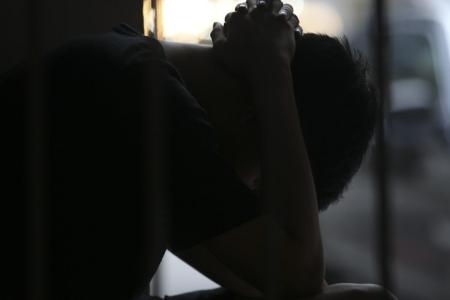Half of S'poreans don't know how to tap suicide support services
At 22, James (not his real name) spent most days cooped up in his room.
Knocks on the door from his family went ignored, and plates of food left on the dining table for him were uneaten.
His mother chalked it up to his adjusting to being unemployed after finishing his national service and failing to get into university. She did not know her son was on the other side of the door thinking about ending his life.
James said: “I knew I needed help, but I did not know who to turn to. Plenty of websites and hotlines popped up on the internet when I searched, but I just could not make the call. I felt too awkward to reach out to a professional helpline, but at the same time, ashamed to confide in someone I knew.”
He found the courage to open up only when a friend, who was worried after James ignored his messages for weeks, went to his house to check on him. His friend referred him to a social service agency for intervention.
A new survey has found that only about half of Singaporeans know how to access support services for suicide. The other half of respondents said they are either uncertain or do not know how to get help.
With such a gap in the knowledge about support services, especially in an emergency, more efforts are needed to spread awareness of suicide-related helplines and resources, said advocacy group SG Mental Health Matters.
The study is part of a new White Paper, titled Project Hayat (“life” in Malay), that it launched on Sept 10 calling for a national suicide prevention strategy in Singapore.
The report is a community-led effort, guided by a working group that comprises suicide experts, researchers, community workers and those whose lives have been impacted by suicide. SG Mental Health Matters is co-led by former nominated MP Anthea Ong; Dr Jared Ng, medical director at Connections MindHealth; and Dr Rayner Tan, assistant professor at the National University of Singapore.
As part of the research that backed the 160-page paper, about 580 Singaporeans aged 21 and above were polled in surveys or consulted in focus group discussions.
One barrier that could prevent access to suicide prevention services is the stigma that is still attached to seeking help. Young people may be less likely to reach out to these services out of fear that it may appear on their records, respondents said.
A first responder said that a lot of young people would rather not seek help, and are unwilling to access services at the Institute of Mental Health because “friends will see them as crazy”.
The paper called for a national public awareness campaign, using media and social media channels, to highlight the avenues for early intervention and reduce the stigma of seeking help.
The campaign should foster a supportive environment to encourage people to seek help before they reach a crisis point, and educate the public about recognising warning signs and preventing suicides.
While some respondents said they would rather seek support from someone they know, the majority of survey respondents also expressed uncertainty and a lack of confidence in their ability to help a friend or loved one who is thinking about suicide or in identifying signs of whether the person is at risk.
Many said that while they are willing to listen and provide support, they feel inadequately equipped to offer the necessary help. There is also a recurring theme of fear of saying the wrong thing and potentially worsening the situation.
The White Paper noted the need to build capacity among Singaporeans and ensure a sufficient proportion of the population is trained in suicide risk assessment and intervention.
It also suggested involving people whose lives have been directly impacted by suicide in all aspects of suicide prevention, including policymaking, implementation, research and advocacy.
There were 322 suicides reported in Singapore in 2023, according to data from suicide prevention charity Samaritans of Singapore.
In 2022, 476 cases were reported in the Republic, marking the highest number of suicides since the Samaritans started recording data in 2000.
One bereaved parent who participated in a focus group discussion noted positive changes – that the topic of suicide is not as taboo as before, and schools have started to conduct mental wellness talks for students and parents.
But some educators also said the capacity and support structures for suicide prevention efforts in schools seem to be most accessible at higher levels of education, such as universities.
Educators also said they lack the bandwidth to provide support for students or to support them in crisis, especially if it is beyond school hours.
One educator said: “In today’s world, students may not be sure how to navigate emotional issues. A lot of stressors are outside of school – that’s the time when people really need help; therefore, people need to know about resources outside of school.”
The report suggested incorporating mental health and suicide prevention education into school curricula.
SG Mental Health Matters said: “Implementing comprehensive mental health and suicide prevention education in schools can significantly benefit students by helping them understand and manage their emotions, recognise signs of distress in themselves and others, and seek help when needed.”
By fostering a supportive environment, schools can empower students with the tools they need to navigate mental health challenges effectively, it said.
Integrating these lessons into the curriculum can also reduce any stigma associated with mental health issues, encourage open discussions, and promote a culture of support and empathy among students, it added.
The White Paper also recommended setting up a national office dedicated to the prevention of suicide in Singapore.
The full report is available at sgmentalhealthmatters.com
Get The New Paper on your phone with the free TNP app. Download from the Apple App Store or Google Play Store now


